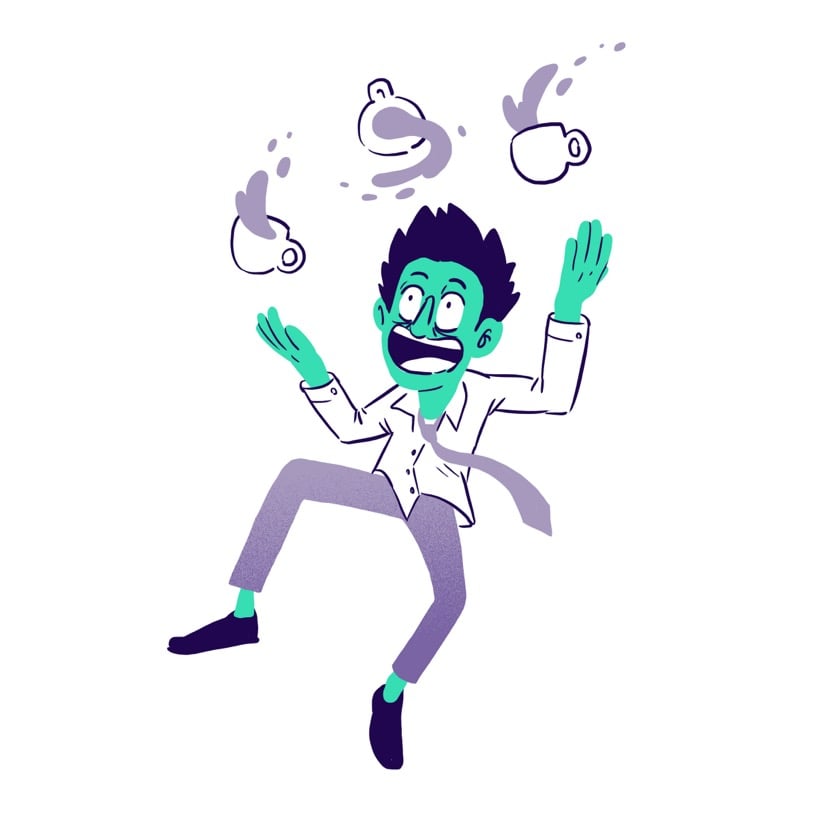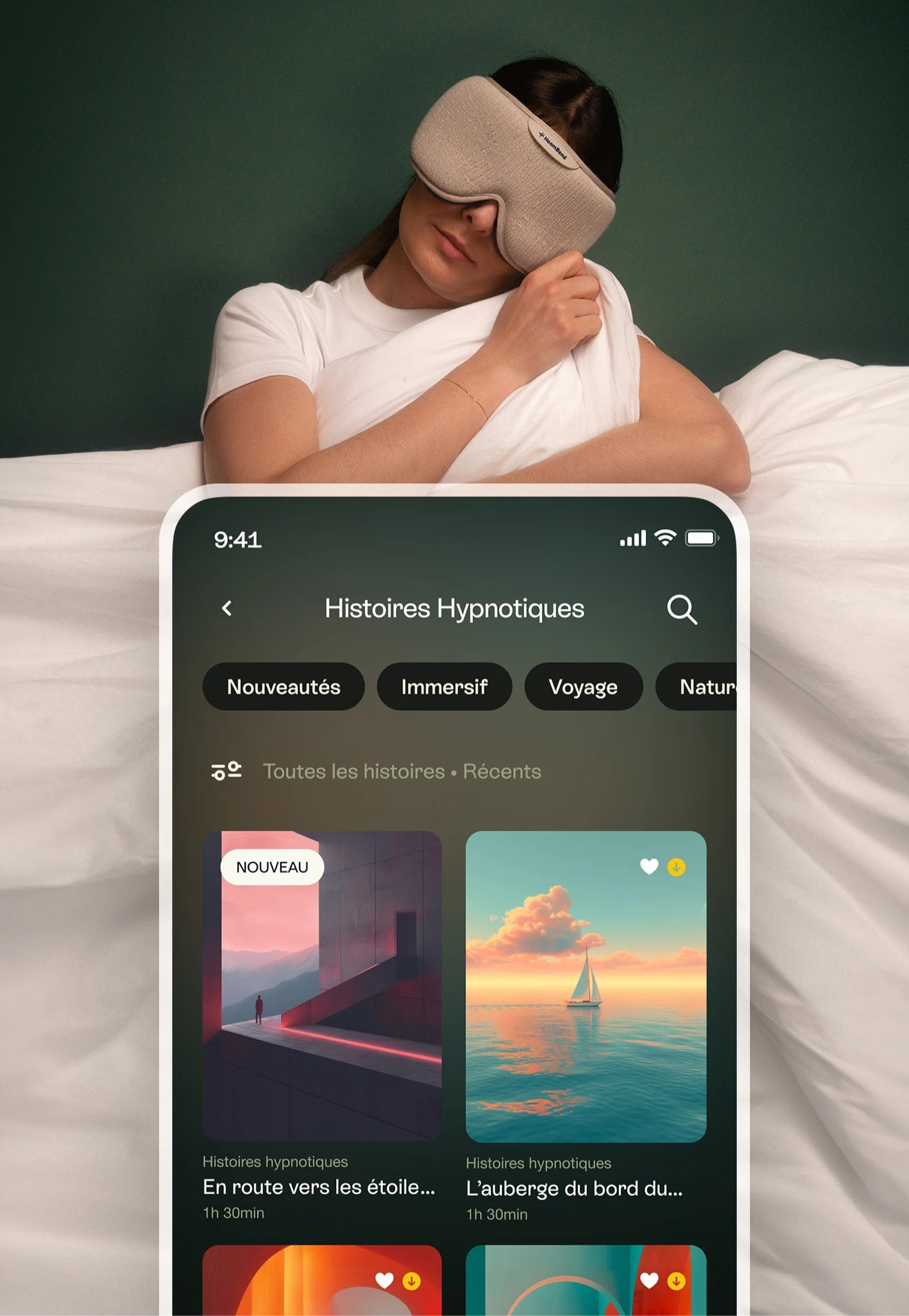Is drinking coffee bad for our sleep?
Coffee is an institution of our civilization. It is everywhere and has been consumed for centuries by almost every population on the planet. It is the most consumed hot or cold drink in the world after water: 2.6 billion cups are drunk per day! This omnipresence of coffee in our lives as well as its high consumption have led doctors and the scientific community to wonder about the effects of coffee on our health . How does our body react to the caffeine present in so many of our daily drinks? But above all, the existential question that burns on all of our lips, the one that animates many meals (especially dinners!) without ever being truly resolved: does drinking coffee in the evening prevent you from sleeping? Everyone has asked themselves this question at least once, right?
At restaurants, we often ask for the bill at the same time as the coffee, and sometimes it's as if we're taking home a little caffeine insomnia as a tip for the night! So, is caffeine really bad for our sleep?
Would you like a little insomnia with your coffee?
Strictly speaking, it is not coffee itself that would have an influence on the body, but rather a substance contained in it: caffeine. Moreover, the latter is not only present in coffee. Without us realizing it, caffeine is one of the most consumed psychotropic substances . It is found in tea, in chocolate, but also and especially in all cola-based drinks. It is easy for each of us to find ourselves a little, or even a lot, in this short list of consumer products. Are we all "addicted" to this psychotropic substance called caffeine? It is quite possible! In any case, a first indication is given to us regarding the famous evening coffee thanks to several studies, notably one carried out in 2013 1 by members of the Sleep Disorders Research Center at Henry-Ford Hospital in Detroit : "It is better to abstain from consuming a lot of caffeine for at least 6 hours before bedtime." concludes this study. In addition, Professor Jean Costentin, member of the Academies of Medicine and Pharmacy, wrote in 2010 in his book ( Coffee, Tea, Chocolate. The Benefits for the Brain and for the Body , Éditions Odile Jacob) "that a dose of caffeine of 150 mg, taken half an hour before bedtime has the effect of greatly extending the period of falling asleep, significantly reducing the duration of sleep, but also acting on other elements of the architecture of sleep, in particular by reducing the time devoted to the deepest stages of slow-wave sleep, the most restorative." This has the merit of being clear.

Well, you can now retort at all your future dinner parties that it's obvious that coffee has a detrimental effect on sleep quality . It's a fact! However, it might be worth investigating this question a little further. Perhaps we're not all equal when it comes to the effects of caffeine on our circadian rhythm? What if coffee also has unsuspected effects?
A coffee and addiction please!
Coffee, besides its omnipresence, is also distinguished by the addiction it causes. The morning cup of coffee, the midday espresso (you know, the one that would wake the dead because it's so powerful!), the famous "coffee break" at work, so many occasions to drink coffee that a true "caffeine addict" knows is impossible to do without. Throughout the day, caffeine stimulates and energizes. It's difficult to do without it, day and night, according to a 2018 study 2 : a coffee detox, and it's a guaranteed bad mood! This addiction even leads to a vicious circle since we consume coffee to be in shape and perform, often to compensate for a lack of sleep... which can itself be caused by caffeine. Furthermore, coffee has the more unexpected effect of disrupting restorative sleep during the day more than at night by making it "more vulnerable to the circadian wake-up signal" according to an experiment carried out in 2019 3 , for people working night shifts for example.

So, the impact of coffee on sleep quality, both day and night, seems just as real as the addiction it causes. However, does coffee consumption have the same consequences for everyone?
To each his own coffee!
Indeed, as with many things in the field of health and nutrition, we are probably not all equal when it comes to our cup of coffee . The bill, just like addiction, is not the same for everyone! This is essentially what an article written by Dr. SH Onen published on the website of the University of Lyon 4 reveals: "After 4 to 5 days of daily consumption, a tolerance to the stimulating effects of caffeine can appear." Thus, in chronic coffee drinkers, sleep-related disturbances can disappear. It is also very interesting to note that another more recent study goes much further and even causes a lot of ink to flow (but not coffee!). Indeed, Dr. Christine Spadola (a referenced specialist in the study of sleep) from Florida Atlantic University conducted a study in association with Harvard Medical School in 2019 . The aim of this study was to scientifically and longitudinally evaluate the combined and separate effects of three factors on sleep: alcohol, nicotine, and caffeine. The results 5 surprisingly showed that no association was observed between caffeine intake in the four hours before bedtime and any of the sleep parameters. This is the first renowned study to conclude that, unlike alcohol and tobacco, coffee does not prevent sleep.
So there would be hope for all "coffee addicts" of not having to pay too high a bill for their guilty evening coffees!
Sources:
[1] Caffeine effects on sleep taken 0, 3, or 6 hours before going to bed , C. Drake, T. Roehrs et al, Journal of Clinical Sleep Medicine , November 2013 [2] Effects of caffeine on sleep quality and daytime functioning , F. O'Callaghan, O. Muurlink et al, Risk Manag Healthc Policy , December 2018 [3] Effects of caffeine on daytime recovery sleep: A double challenge to the sleep-wake cycle in aging , J. Carrier, J. Paquet et al, Sleep Medicine , October 2009 [4] Caffeine , SH Onen, D. Bailly et al, Prevention and treatment of dysosmia through sleep hygiene. , 1994 [5] Evening intake of alcohol, caffeine, and nicotine: night-to-night associations with sleep duration and continuity among African Americans in the Jackson Heart Sleep Study , CE Spadola, N. Guo et al, Sleep , October 2019


